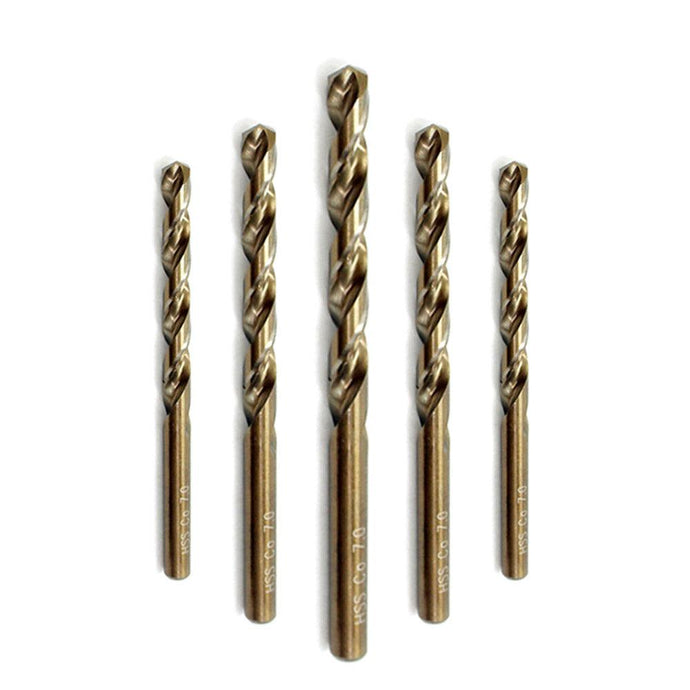
Welcome to Leader in Component Manufacturing since 1985

Phone: +91 - 22 - 26208929 | Email: info@contourengineers.com
Welcome to Leader in Component Manufacturing since 1985

Phone: +91 - 22 - 26208929 | Email: info@contourengineers.com
When it comes to drilling, the type of drill bit you use can make all the difference. The right bit ensures clean, precise holes, enhances efficiency, and minimizes wear and tear on your tools. However, with so many different drill bits available, it can be overwhelming to determine which is best suited for your task. Understanding the various types of drill bits can transform your projects from frustrating to flawless, whether you're working with wood, metal, masonry, or more delicate materials like glass.
Twist drill bits are the most common and versatile type. These bits feature a cylindrical shank with two cutting edges spiraling along the length, designed to cut through a variety of materials, including wood, metal, and plastic. Twist drill bits are typically made from high-speed steel (HSS) and are available in various coatings, such as black oxide or titanium, to enhance durability and reduce friction. Their adaptability makes them a staple in most toolboxes, especially for general-purpose drilling needs.
For drilling large, precise holes in sheet metal, step drill bits are an excellent choice. These bits have a conical shape with progressively larger cutting steps, allowing you to create different-sized holes with a single bit. Step drill bits are particularly useful for electrical work, HVAC installations, and automotive projects where metal sheeting is common. They cut smoothly and efficiently through thin materials while minimizing the risk of tearing or distorting the metal.
When it comes to working with wood, spade bits, also known as paddle bits, are an excellent solution for drilling larger holes. These bits have a wide, flat blade with a sharp point at the center, designed to quickly bore through wood. Spade bits are great for rough jobs, such as drilling holes in studs for running cables and pipes. They aren't known for producing the cleanest holes, but their speed and efficiency make them ideal for framing and general construction tasks where precision is less critical.
For more precise woodworking, brad point drill bits are a superior choice. These bits feature a sharp center point, or brad, which allows for more accurate positioning on the workpiece. The cutting edges are designed to slice cleanly through wood fibers, minimizing splintering and providing a smooth, finished hole. Brad point bits are a favorite among furniture makers, cabinet builders, and other woodworkers who require clean, accurate holes in delicate wood materials.
Hole saws are specialized drill bits designed to cut large-diameter holes. Unlike twist or spade bits that remove material from the center of the hole, hole saws cut around the perimeter, removing a circular plug. These bits are often used in applications where large holes are necessary, such as installing doorknobs, running wiring, or fitting plumbing pipes. Hole saws can be used on a variety of materials, from wood to plastic to thin metals, making them a valuable addition to any toolkit.
Masonry drill bits are specifically designed to tackle hard materials such as brick, concrete, and stone. These bits feature a carbide tip that allows them to withstand the high friction and heat generated by drilling into tough surfaces. Often used in conjunction with hammer drills, masonry bits are essential for tasks like installing anchors, brackets, or fixtures in concrete walls or masonry. Their ability to cut through dense materials makes them indispensable for building and construction projects.
Cobalt drill bits are the go-to choice for drilling into tough metals like stainless steel, cast iron, and titanium. Made from a high-speed steel alloy that includes cobalt, these bits are built to withstand high temperatures and maintain sharpness longer than standard HSS bits. Cobalt bits are a must-have for any metalworking project that requires durability and precision, particularly in industrial and heavy-duty applications.
For working with delicate materials such as glass, ceramics, or tiles, glass and tile drill bits are specially designed to prevent cracking or shattering. These bits have a spear-shaped tip that allows for controlled, steady drilling into brittle surfaces. They are often used with a steady water supply to keep the bit cool and prevent the material from overheating. Glass and tile bits are ideal for home improvement projects like installing bathroom fixtures, where precision is crucial to avoid damaging costly materials.
Auger bits are designed for drilling deep, clean holes in wood. These bits feature a long, spiraled body and a sharp point that pulls the bit into the material as it drills, creating smooth, consistent holes with less effort. Auger bits are commonly used in carpentry and construction when deep, accurate holes are needed, such as for installing bolts or dowels in beams and timbers.
Each type of drill bit is engineered with a specific purpose in mind, making it crucial to select the right bit for the job. From versatile twist drills to specialized masonry, glass, or auger bits, understanding the strengths and limitations of each type can save time, improve results, and extend the life of your tools. Armed with this knowledge, you can confidently tackle any project, knowing you have the perfect drill bit to match the material and the task at hand.
